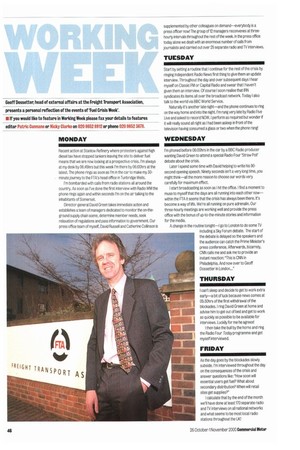Geoff Dossetter, head of external affairs at the Freight Transport
Page 48

If you've noticed an error in this article please click here to report it so we can fix it.
Association, presents a personal reflection of the events of `Fuel Crisis Week' .
• if you would like to feature in Working Week *lase fax your details to features editor Patric Cunnane or Nicky Clarke on 020 8652 8912 or phone 029 8652 3678.
MONDAY
Recent action at Stanlow Refinery where protesters against high diesel tax have stopped tankers leaving the site to deliver fuel means that we are now looking at a prospective crisis. I'm always at my desk by 06:45hrs but this week I'm there by 06:00hrs at the latest. The phone rings as soon as I'm in the car to make my 30minute journey to the ETA's head office in Tunbridge Wells.
I'm bombarded with calls from radio stations all around the country. As soon as I've done the first interview with Radio WM the phone rings again and within seconds I'm on the air talking to the inhabitants of Somerset.
Director-general David Green takes immediate action and establishes a team of managers dedicated to monitor the on-theground supply chain scene, determine member needs, seek relaxation of regulations and pass information to government. Our press office team of myself, David Russell and Catherine Collinson is supplemented by other colleagues on demand—everybody is a press officer now! The group of 12 managers reconvenes at threehourly intervals throughout the rest of the week. In the press office today alone we dealt with an enormous number of calls from journalists and carried out over 25 separate radio and TV interviews.
TUESDAY
Start by setting a routine that I continue for the rest of the crisis by ringing Independent Radio News first thing to give them an update interview. Throughout the day and over subsequent days I hear myself on Classic FM or Capital Radio and swear that I haven't given them an interview. Of course I soon realise that IFIN syndicates its items all over the broadcast network. Today I also talk to the world via BBC World Service.
Naturally it's another late night—and the phone continues to ring on the way home and into the night. I'm rung very late by Radio Five Live and asked to record NOW. I perform as required but wonder if it will really sound all right as I had been asleep in front of the television having consumed a glass or two when the phone rang!
WEDNESDAY
I'm phoned before 06:00hrs in the car by a BBC Radio producer wanting David Green to attend a special Radio Four 'Straw Poll' debate about the crisis.
Later I spend some time with David helping to write his 90second opening speech. Ninety seconds isn't a very long time, you might think—all the more reason to choose our words very carefully for maximum effect.
I start broadcasting as soon as I hit the office. I find a moment to muse to myself that the days are all running into each other now— within the FTA it seems that the crisis has always been there. It's become a way of life. We're all running on pure adrenalin. Our three-hourly meetings are working well and provide the press office with the bonus of up-to-the-minute stories and information for the media.
A change in the routine tonight—I go to London to do some TV including a Sky Forum debate. The start of the debate is delayed so the speakers and the audience can catch the Prime Minister's press conference. Afterwards, bizarrely, CNN calls me and ask me to provide an instant reaction: "This is CNN in Philadelphia. And now over to Geoff Dossetter in London..."
THURSDAY
I can't sleep and decide to get to work extra early—a bit of luck because news comes at 05:30hrs of the first withdrawal of the blockades. I ring David Green at home and advise him to get out of bed and get to work as quickly as possible to be available for interviews. Luckily for me he agrees!
I then take the ball by the horns and ring the Radio Four Today programme and get myself interviewed.
FRIDAY
As the day goes by the blockades slowly subside. I'm interviewed throughout the day on the consequences of the crisis and answer questions like: "How soon will essential users get fuel? What about secondary distribution? When will retail sites get supplies?"
I calculate that by the end of the month we'll have done at least 170 separate radio and TV interviews on all national networks and what seems to be most local radio stations throughout the UK!












































































































